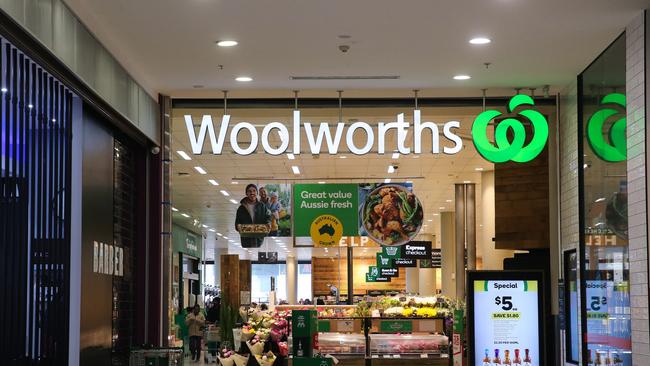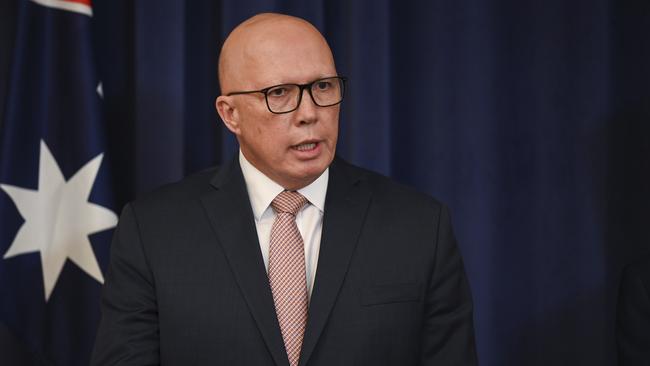Peter Dutton’s ‘big supermarkets stick’ sets dangerous tone for business
From energy to supermarkets, Peter Dutton is proving instincts are built on more, not less, market intervention.

Business
Don't miss out on the headlines from Business. Followed categories will be added to My News.
Be it in energy or retail, Peter Dutton is proving his Liberal instincts on business are firmly built around market intervention.
However, it is the Nationals tail wagging the Liberal dog through the latest policy that threatens a carve-up of supermarkets and hardware stores. As Dutton likes to say, it’s the big stick for big retail: Bunnings, Coles and Woolworths.
Yet, it’s all relative. The Aussie companies are serious minnows competing against the $US2 trillion ($3 trillion) Amazon.
Like taxpayer-funded nuclear power, the push to break up supermarkets is a distortion that in its execution will only drive operating up costs for consumers and could curb long-term investment plans.

It also comes after the fringe left, the Greens, had made their own demands for breaking up the supermarkets and this policy was rubbished by serious heads, including some city-based Liberals. Still, Dutton left the door open for a divestment call by Nationals leader David Littleproud.
In short, it’s a stupid nod to economic populism from the Coalition that should instead be making a go of staking out the higher ground by giving all businesses the confidence needed to grow, invest and employ more Australians in the face of tougher economic times.
As details of the divestment threat emerged from Canberra, shares in Coles, Woolworths and Bunnings owner Wesfarmers, turned negative and each closed down for the day. Even from opposition the policy sets a dangerous tone for business.
With the Greens rushing to support the federal Opposition’s policy it’s little wonder Dutton and his finance spokesman, Angus Taylor, attempted to walk back from the plan just as quickly as it was passed during a joint party room vote.
Taylor was promising plenty of safeguards to neutralise the policy, including tying any misuse to breaches of section 46 of the Competition Act, and a public interest test under which divestment must lead to a substantial improvement in competition to consumers, suppliers and jobs. With the interests of each of these groups pulling in different directions, this will be impossible to achieve.
Taylor acknowledged criticism that forced divestment could result in the loss of jobs or the significant loss of shareholder value. “The public interest tests ensures that is not possible,” he told reporters.
In other words, it is a useless policy the only role of which is to appease the Nationals while undermining confidence. To think when in government the Coalition once boasted of having a minister for cutting red tape.
The proposal comes in the middle of a two-year review of competition policy overseen by Treasury and an advisory panel involving Kerry Schott, David Gonski and former ACCC boss Rod Sims.
The first round of reforms was around a recommendation for a shake-up of merger rules such as mandatory notification and tools to fast track approval for low impact mergers. This includes divestment powers on mergers where the ACCC was seriously misled through its approvals process or as an agreement to get a merger approved.
The next step in the Treasury review will be looking at how anticompetitive behaviour impacts employment, and issues raised by new technologies.
Economist and left-leaning former Labor MP Craig Emerson, who recently reviewed the supermarket code of conduct, declared forced divestment wasn’t the way to bring supermarkets to heel.
He argued it could lead to greater concentration and job losses if no buyers were found and store closures followed.
Instead, Emerson recommended that tougher financial penalties for supermarkets which breach the code of conduct, running into billions of dollars, was the way to bring errant operators into line.

Even though a recent Greens-led Senate inquiry into supermarket power was more performative than an exercise in fact finding, Coles chief executive Leah Weckert managed to point out that forced breakups would drive up prices.
It means the powerful force underpinning Australia’s supermarket sector – economies of scale – would be eroded, and customers would be all the worse for it. Economies of scale help maintain a national pricing regime, meaning the cost for most items are the same whether someone is buying a box of cornflakes in Bunbury or Brighton.
Weckert also noted that new entrants buying a portfolio of supermarkets would have to invest billions of dollars setting up a new distribution network to back their stores. Remember, German major Kaufland baulked when confronted with the Australian start-up costs.
Under pressure to deliver on shareholder returns, the slimmed down supermarkets could axe less profitable regional stores, or crimp on other spending such as technology, she warned.
Preventing misuse of market power is the bedrock of competition law and current rules are framed around conduct, not necessarily linked to market power. The regulator has powers to demand fines running into 10 per cent of turnover.
The Coalition needs to find a better answer to how intervention leads to better outcomes for consumers.
Time for Dutton to put the stick away and focus on lowering, rather than driving up, the cost of doing business.
Originally published as Peter Dutton’s ‘big supermarkets stick’ sets dangerous tone for business



